California
California legislative wrap-up: Newsom signs multiple bills
In a final flurry of activity this past week and on the final day to take action with legislation on his desk Newsom signs multiple bills
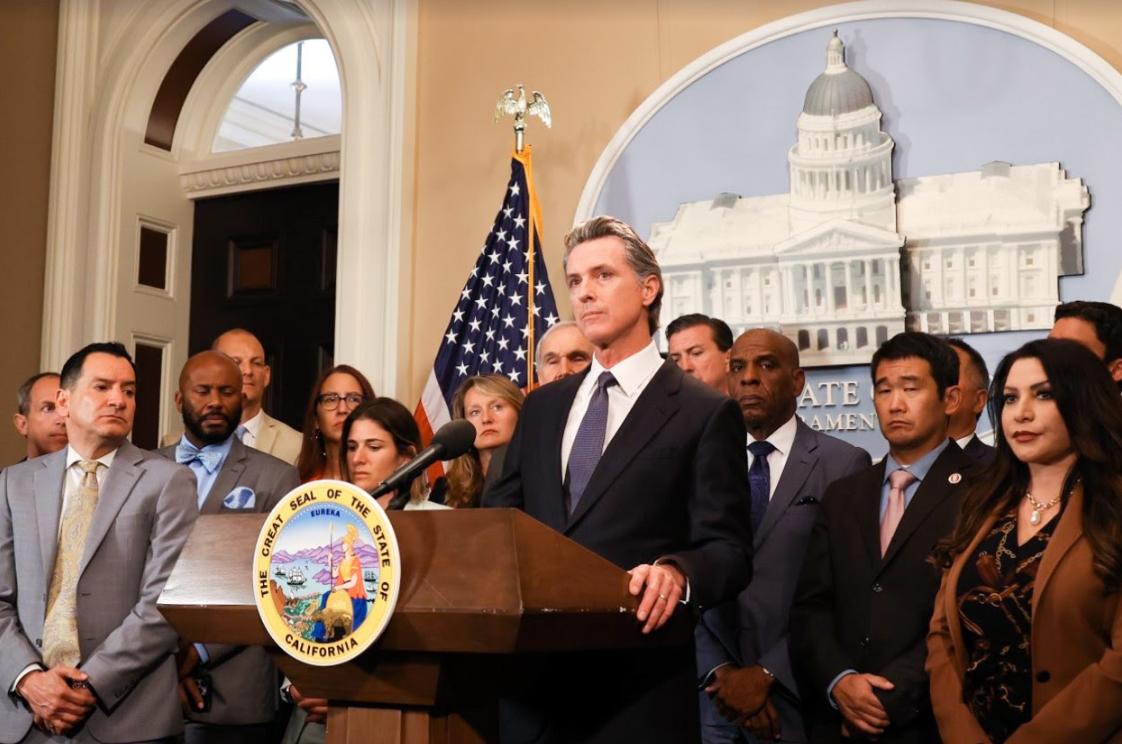
SACRAMENTO – In a final flurry of activity this past week and on the final day to take action with legislation on his desk, California Governor Gavin Newsom for signed multiple bills into law ranging from SB 1194 allows for multi-stall gender-neutral bathrooms in cities that choose to pass such an ordinance to legislation to protect Civil Rights, Support Community Living for Californians with Disabilities.
California to Speed Graduation, Offer Debt Cancellation at Community Colleges
“California is increasing resources, adding services, and advancing equity to boost graduation and transfer rates throughout our higher education systems,” said Governor Newsom.
The bills signed will:
- Ensure that students attending California Community Colleges enroll directly into transfer-level math and English courses, if their program requires it or they are seeking to transfer.
- Expand supervised tutoring offered for foundational skills and transfer-level courses.
- Offer debt cancellation to encourage students to re-enroll and enroll at community colleges, building on budget appropriations.
Senate Bill 1194 Public Restrooms: Building Standards Which Allows for Multi-Stall Gender Neutral Bathrooms
Newsom signed the bill into law on Thursday allowing cities to adopt the new regulations for multi-stall gender-neutral bathrooms by adopting ordinances. In addition, and to afford additional discretion to communities, cities can exclude certain occupancies from the bill’s requirements.
“I am overjoyed that the Governor has signed SB 1194 into law!” said City of West Hollywood Mayor Pro Tempore Sepi Shyne. “I was proud to co-sponsor the City of West Hollywood Multi-Stall Gender Neutral Bathroom Ordinance, which made us the first city in the United States to move to require equity and safety in bathroom access for people with disabilities who have opposite sex caretakers, our transgender, non-binary, and gender non-conforming siblings, and same sex and single parents of opposite sex children. I worked with Senator Ben Allen and his staff, my colleague Councilmember John M. Erickson, and our City legislative staff to help shepherd SB 1194 through the legislature. California is now the first state in the nation to give cities local control to make the same choice West Hollywood did.”
Legislation to Protect Sexual Assault Victims’ DNA Signed into Law
Newsom signed into law Senator Scott Scott Wiener (D-San Francisco)’s Senate Bill 1228, the Genetic Privacy for Sexual Assault Victims Act. It will take effect on January 1, 2023.
SB 1228 protects sexual assault survivors and other victims by prohibiting the retention of DNA profiles collected from victims by local law enforcement agencies — including rape kits for sexual assault survivors. It also prohibits victims’ DNA from being used for any purpose other than identifying the perpetrator of the crime. Thus, a victim’s DNA could not be used in the future against the victim.
“Today, California showed once again that we stand with survivors of sexual assault,” said Senator Wiener. “Sexual assault exams are key to law enforcement finding perpetrators. It is critical that we protect the integrity of that process and ensure that survivors’ DNA is kept private. This law is a meaningful change for those going through what are likely some of the worst moments of their life.”
SB 1228 is sponsored by the San Francisco District Attorney’s Office, the Prosecutors Alliance of California, and Black Women Revolt, an anti-domestic violence advocacy and resource group for Black women.
These protections help ensure the privacy of sexual assault survivors and promote public safety by encouraging survivors to report sexual violence. If a sexual assault survivor believes their rape kit DNA can be used against them in the future, they will have one more reason not to come forward and undergo an invasive rape kit examination.
SB 1228 was introduced following the discovery that a local law enforcement agency was retaining DNA collected from sexual assault survivors in its quality assurance database and then searching that database to incriminate survivors in unrelated crimes. Since the discovery of this practice, advocates for sexual assault survivors and victim rights have widely condemned the practice and called for legislative action. Congressman Adam Schiff has called for a federal investigation.
When victims report a sexual assault, they can consent to a sexual assault examination, also known as a rape kit. During this examination, biological evidence from bodily fluids, fingernail scrapings, and bite and scratch marks is collected from the victim’s body. The victim submits their own DNA sample in order to exclude their DNA from an investigation. In addition, reference samples of those who have close contact with the survivor—such as consensual sexual partners, family members, or other people living in the same household—may be collected as well to differentiate their DNA from that of the perpetrator.
Sexual assault is significantly under-reported; fewer than a quarter of sexual assault survivors come forward to report to police. Of those survivors who do report, only a small percentage undergo the highly invasive process of sexual assault testing. Victims of sexual assault consent to their DNA collection for this purpose, not so that their DNA will be retained in a local law enforcement database permanently to be searched years later. Using victims’ DNA in order to potentially incriminate them in the future further dissuades sexual assault survivors from undergoing what is already a very difficult process.
SB 1228 protects sexual assault survivors and other victims by prohibiting the DNA profiles collected from victims from being used for any purpose other than aiding in identifying the perpetrator. Local law enforcement agencies will also be prohibited from retaining and then searching victim DNA to incriminate them in unrelated crimes.
Federal law already prohibits the inclusion of victims’ DNA in the national Combined DNA Index System (CODIS). However, there is no corresponding California state law to prohibit local law enforcement databases from retaining victims’ profiles and searching them years later for entirely different purposes. This legislation would remedy that by requiring DNA samples taken from victims to be used only for the sexual assault investigation. It would prohibit DNA samples from being included in any database that allows for a sample to be matched with DNA profiles obtained from crime scenes.
The bill would also instruct the Committee on Revision of the Penal Code to study whether additional steps are needed to protect the privacy of Californians who have submitted DNA samples to law enforcement, and determine whether a forensic oversight board is needed.
Assemblymembers Reggie Jones-Sawyer and Phil Ting are co-authors of this legislation.
Legislation to End Wrongful Convictions Due to Faulty Expert Witness Testimony Signed into Law
Newsom signed into law Senator Scott Wiener’s (D-San Francisco) Senate Bill 467. SB 467, the End Wrongful Convictions Act, amends the standards used for evaluating expert testimony and forensics in court post-conviction. This law will take effect on January 1, 2023..
“The End Wrongful Convictions Act will get innocent people out of prison,” said Senator Wiener. “When anyone spends even a day in prison for a crime they did not commit, it’s a terrible miscarriage of justice. Now, we’ll have more tools to help exonerate anyone wrongfully convicted on the basis of outdated or flawed science. This is a victory for the integrity of our criminal justice system.”
“Senator Wiener continues to be a champion for the innocent by authoring and advocating for laws that both help the wrongfully convicted regain their freedom and prevent wrongful convictions from happening in the first place,” said Melissa O’Connell of the California Innocence Coalition.
SB 467 clarifies that the definition of false testimony includes expert opinions undermined by the state of scientific knowledge and creates a path for the wrongfully convicted to obtain justice when their convictions were based on expert opinions about which a significant dispute has emerged or further developed regarding its validity. The California Supreme Court has long recognized that “[l]ay jurors tend to give considerable weight to ‘scientific’ evidence when presented by ‘experts’ with impressive credentials” but emphasized “scientific proof may in some instances assume a posture of mystic infallibility in the eyes of a jury . . .”(People v. Kelly (1976) 17 Cal.3d 24, 31-32.)
Unreliable forensic science remains a leading cause of wrongful convictions, occurring in 45% of DNA exoneration cases nationwide, 24% of all exonerations in the nation and 15% of the California exoneration cases known since 1989. In these cases, “expert” testimony that was either flawed or false forensic science, or relied on scientific methods that are widely debated within the scientific community provided critical evidence leading to the conviction. In California, 70% of these innocent men and women were given life sentences; one was sentenced to death.
SB 467 is part of a larger slate of the California Innocence Coalition’s reform bills. Previously, Senator Wiener authored SB 923, which ensures that law enforcement use evidence-based procedures when obtaining eyewitness identification. Eyewitness misidentification is a leading contributor to wrongful convictions proven with DNA evidence. Before SB 923 was signed into law, California had no statewide best practices for eyewitness identification and there were no evidence-based standards in place. With the passage of SB 467, California takes a giant step forward to address concerns set forth by the scientific community itself as well as to allow our courts to remain lockstep with advancements in science
SB 467 is sponsored by the California Innocence Coalition, which includes the Northern California Innocence Project, the California Innocence Project and the Loyola Project for the Innocent.
Legislation to Expedite Sustainable Transportation Projects Signed into Law
Newsom signed into law Senator Scott Wiener (D-San Francisco)’s Senate Bill 922. It will become law on January 1, 2023. SB 922 extends and improves upon Senator Wiener’s previous legislation (SB 288, 2020) to expedite bike, pedestrian, light rail, and rapid bus projects by exempting these environmentally sustainable projects from the California Environmental Quality Act (CEQA). SB 922 will accelerate approval of sustainable, climate-friendly transportation projects.
In the short time – just 18 months – that SB 288 has been in place, 15 projects have been streamlined in various parts of the state. Another 20 projects are currently under consideration for streamlined treatment. Transit agencies from around the state, including the San Francisco Municipal Transportation Agency, the Los Angeles Department of Transportation, AC Transit, and CalTrain, have invoked this streamlining. Other transit agencies that have made use of SB 288 include: Yuba-Sutter Transit, Tahoe Transportation District, Napa Valley Transportation Authority, Santa Rosa CityBus, Fairfield and Suisun Transit, Monterey-Salinas Transit District, Culver City CityBus, Long Beach Transit, and Riverside Transit Authority. Streamlined projects include protected pedestrian walkways and bike lanes, bus rapid transit projects, electric vehicle charging for buses, and more.
“Increasing sustainable transportation options – like biking, walking, and public transit – is incredibly important when it comes to reducing carbon emissions and fighting climate change,” said Senator Wiener. “SB 922 continues our work to make it easier to build these projects more quickly and at lower cost, and will get people out of their cars. This is great news for California and for our climate. Thank you, Governor Newsom.”
Free Books for Children, Support for Student Athletes and Creative Expression
Newsom signed SB 1183 by Senator Shannon Grove (R-Bakersfield), expanding Dolly Parton’s Imagination Library Program to children statewide. Under the initiative, launched to inspire a love of reading at an early age, California children under the age of five will be eligible to enroll in the program to receive a free book every month through a direct mail program starting in June 2023.
Joined virtually by award-winning rappers, record producers and record industry executives, Governor Newsom signed AB 2799 by Assemblymember Reginald Byron Jones-Sawyer, Sr. (D-Los Angeles), a first-in-the-nation bill that limits the use of creative expression like rap lyrics as evidence in criminal cases to protect against bias.
In a virtual ceremony, Governor Newsom signed AB 2747 by Assemblymember Adrin Nazarian (D-North Hollywood), which will make Olympians, Paralympians and elite Olympic hopefuls who train in California eligible for in-state tuition.
California Empowers Students
The Governor signed SB 997, SB 955, and SB 291 empowering students in California by:
- Providing a seat at the table in local accountability plan processes.
- Allowing an excused absence from school to engage in civic opportunities in their communities.
- Adding two pupils with exceptional needs to the Advisory Commission on Special Education.
Newsom also signed AB 2806 by Assemblymember Blanca Rubio (D-Baldwin Park) ensuring equitable treatment of children in state preschool and child care programs by prohibiting suspensions and expulsions except as a last resort. When a child is suspended or expelled, they do not receive the benefits that early learning and education provides and this disportionately impacts toddlers and preschoolers of color. AB 2806 aims to change this and support California’s youngest learners.
Additionally, the Governor signed SB 1047 by Senator Monique Limόn (D-Santa Barbara) increasing access and stability for families to get the care and learning opportunities their kids need and are critical for young children to succeed.
Newsom Signs Legislation to Protect Civil Rights, Support Community Living for Californians with Disabilities
Newsom signed AB 1663 by Assemblymember Brian Maienschein, which reforms California’s probate conservatorship system to enable disabled and older people needing support to care for themselves to pursue supported decision-making as a less restrictive alternative to conservatorship. The bill also makes it easier to end a conservatorship.
“Our state is committed to protecting civil rights and lifting up every Californian with the supports they need to thrive in their community,” said Newsom. “This measure is an important step to empower Californians with disabilities to get needed support in caring for themselves and their finances, while maintaining control over their lives to the greatest extent possible.”
AB 1663 establishes supported decision-making in statute as an alternative to probate conservatorship. This is a process in which adults with intellectual, developmental, dementia, and other disabilities who need support to care for themselves or their finances can consult with trusted supporters while making choices about their life, without jeopardizing their self-determination. The bill also requires that alternatives to conservatorship are included for consideration in a petition for conservatorship, and requires courts to provide conservatees with information regarding the rights that they retain. Under AB 1663, courts are allowed to terminate a conservatorship without a hearing if both the conservatee and conservator agree to termination.
“Everyone deserves to have control over the choices they make in their daily lives, including individuals with disabilities. AB 1663 prioritizes that right by emphasizing less-restrictive alternatives to probate conservatorships, specifically Supported Decision-Making. I am grateful that the Governor signed this important legislation today,” said Assemblymember Brian Maienschein (D-San Diego).
State law allows the courts to appoint a conservator for an adult when a third party such as law enforcement or Adult Protective Services is concerned about the health, safety or welfare of a person and there has been a comprehensive review of the individual’s circumstances. Information about recent actions by the California Department of Developmental Services (DDS) to support individuals conserved by DDS can be found here.
Governor Newsom also signed AB 1195 by Assemblymember Cristina Garcia (D-Bell Gardens) which facilitates the hiring of people with disabilities within state government through the Limited Examination and Appointment Program (LEAP).
California raises wage replacement for new parents, sick workers
Newsom has signed a bill that will increase the amount of money workers receive under the state’s paid family and medical leave program, providing a boost that supporters say will ensure lower wage workers are not locked out of a benefit they are already paying for.
Beginning in 2025, the state will pay up to 90% in wage replacement for new parents and those who need to take time off to care for a seriously ill family member or themselves. Senate Bill 951 by Sen. María Elena Durazo (D-Los Angeles) also ensures that the wage replacement will remain between 60% and 70% during the next two years after the rate was scheduled to return to 55% beginning Jan. 1.
California Expands Support for Working Families
Newsom today signed legislation to help hard-working Californians access family and disability leave benefits. SB 951 by Senator María Elena Durazo (D-Los Angeles) will boost leave benefits for lower- and middle-income employees to cover more of their regular income while they take much-needed time off to care for loved ones.
“California families and our state as a whole are stronger when workers have the support they need to care for themselves and their loved ones,” said Governor Newsom. “California created the first Paid Family Leave program in the nation 20 years ago, and today we’re taking an important step to ensure more low-wage workers, many of them women and people of color, can access the time off they’ve earned while still providing for their family.”
SB 951 extends increased wage replacement rates for State Disability Insurance and Paid Family Leave that were set to sunset at the end of the year. Under the legislation’s phased increase in benefits, by 2025, workers earning less than the state’s average wage could receive up to 90% of their regular wages while taking leave.
SB 951 builds on the Governor’s action since taking office to bolster access to workplace leave, including legislation to expand job-protected family leave to millions more Californians, extend paid family leave benefits for a newborn child from 6 to 8 weeks and expand paid sick leave in response to COVID-19.
Yesterday, Governor Newsom signed AB 1041 by Assemblymember Buffy Wicks (D-Oakland) which enables workers to take paid sick leave or family leave in order to care for any person designated by the employee, including non-family members. The Governor also signed AB 152 to extend COVID-19 Supplemental Paid Sick Leave through the end of the year and AB 1949 by Assemblymember Evan Low (D-Campbell) which allows workers to take job-protected bereavement leave.
Newsom Signs Legislation to Crack Down on the Sale of Stolen Goods Online
With online marketplaces selling stolen merchandise, Governor Newsom today signed legislation to strengthen transparency rules for high-volume, third-party sellers and provide greater tools for law enforcement to identify stolen items, often taken from doorsteps or shoplifted at retail stores.
“We are tightening the spigot, reducing the sale of online illegal merchandise,” said the Governor. “By empowering consumers with the ability to identify stolen items for sale online and providing greater transparency for high-volume sellers, we are tackling this problem at the source. Thanks to the work of my partners in the Legislature, in California, we are addressing the crime we see affecting the nation through a multipronged approach focused on deterrence, enforcement, and prevention.”
Both SB 301 by state Senator Nancy Skinner (D-Berkeley) and AB 1700 by Assemblymember Brian Maienschein (D-San Diego) work to address the online sale of stolen merchandise. SB 301 calls for online marketplaces to require high-volume third-party sellers to provide greater information to protect consumers. These requirements include contact and bank account information, as well as a seller’s physical address. AB 1700 directs the Attorney General’s Office to dedicate a section of its website for individuals to report items found on online marketplaces, identified as possible stolen goods. The Attorney General will share this information with local law enforcement agencies. The bill will also require online marketplaces to display a link to the Attorney General’s webpage.
The Governor also signed AB 2294 by Assemblymember Reginald Byron Jones-Sawyer Sr. (D-Los Angeles), which gives law enforcement the ability to keep in custody individuals suspected of organized retail theft. Under the current process, an individual arrested for a misdemeanor is typically released with a written notice or citation. This bill will allow for law enforcement to keep in custody a person arrested for a misdemeanor if they have been convicted of theft from a store in the last six-months, or if there is probable cause that the individual is guilty of participating in organized retail theft.
Today’s bill signing comes on the heels of the Governor’s announcement of California’s Real Public Safety Plan, which includes hundreds of millions in funding to provide grants for local District Attorneys to address retail theft, establish a statewide organized theft team in the Attorney General’s Office, make permanent and expands the Organized Retail Theft Task Force led by CHP, and create the largest gun buyback program in the country. The plan also includes grants for local law enforcement, prosecutors, and small businesses victimized by retail theft.
Fresh Start Act, to Remove Outstanding Restitution as a Barrier to Expungement
Newsom signed into law Senator Scott Wiener’s (D-San Francisco) Senate Bill 1106, the Fresh Start Act. It will become law on January 1, 2023.
SB 1106 helps people clear their criminal records by ensuring outstanding restitution and restitution fines are not a barrier to expungement. Currently, people across California are frequently denied record sealing and expungement because they are poor and cannot afford to pay outstanding restitution and restitution fines. Restitution debt is often the only thing holding someone back from clearing their record and finding a job and housing. This exacerbates the cycle of poverty and criminalization of Black and brown communities, who are disproportionately impacted by the criminal legal system.
“This is a huge moment for anyone who has served their time and is looking to start over fresh,” said Senator Wiener. “Now, outstanding restitution debt won’t be a barrier to getting one’s record cleared. Formerly incarcerated people will be able to more easily access housing and jobs, which will ultimately help them pay off this debt. Thank you, Governor Newsom, for seeing the value of a fresh start.”
Two types of restitution payments are frequently imposed on anyone convicted of a crime. The first is a restitution fine, which is a fixed amount charged to anyone with a conviction regardless of the crime and its impact. Restitution fines can run in the thousands and even more than $10,000. The second is direct restitution, by which a court can order someone to compensate a victim for the harm caused to the victim.
When setting these amounts, courts are not required to take into account a person’s ability to pay that restitution. This means that victims of crime, who are awarded restitution, overwhelmingly receive either nothing or a small percentage of the restitution because a defendant lacks the resources to actually pay it.
Current law allows courts to deny a request for expungement of a conviction — even if the individual is otherwise eligible for expungement — if they have any outstanding unpaid restitution. A court can deny expungement on this basis even if the defendant is living in poverty.
This kind of barrier to reentry does not increase the likelihood that someone will pay off their restitution. In fact, blocking someone from clearing their record makes it even less likely that they’ll ever be in a position to pay restitution. A 2014 study by Stanford University and the San Jose State University Record Clearance Project found that the estimated benefits of expungement outweigh costs by about $5,800, per person, in one year – nearly $6,500 in today’s dollars.
Under SB 1106, people who have served their time would be able to clear their criminal records despite owing restitution, if they otherwise meet the criteria for that relief. SB 1106 does *not* cancel a person’s restitution debt. Rather, the legislation allows a person to clear their record and move forward in life despite being too poor to pay restitution.
The bill is sponsored by a multi-regional coalition focused on modifying the court fee system and ending wealth extraction through the criminal legal system, which disproportionately impacts Black and Brown communities, inflicting life-long monetary subjugation on them. The coalition is made up of legal advocates, formerly incarcerated people, policy experts, and movement building organizations led by impacted people.
Newsom signs game-changing elections bill, The Ballot DISCLOSE Act
Newsom signed AB 1416 – The Ballot DISCLOSE Act – a bill that will have a major positive impact on ballot measure transparency. All statewide ballot measures will now include a list of supporters and opponents on the ballot itself. Lead authors were Assembly Member Miguel Santiago (D-Los Angeles) and Senator Henry Stern (D-Calabasas).
“This bill is a colossal game changer for California elections because voters will now be able to make more informed choices on ballot measures,” said Assembly Member Santiago. “Big money in politics continues to capitalize on the lack of ballot measure transparency, which directly affects the outcome of elections. As more and more ballot measures appear on general election ballots, it is imperative voters have the information they need to cast an informed vote on state and local ballot measures. The Ballot DISCLOSE Act will bring greater transparency and democracy to the ballot box on Election Day.”
“This law will vastly improve voters making an informed choice when voting, and finally root out the special interest that lurk in the shadows seeking to mislead the public,” said Senator Stern.
“Governor Newsom’s signature of the Ballot DISCLOSE Act will ensure that every Californian voter will know key supporters and opponents of ballot measures when they vote, just like every legislator when they vote and the Governor when he signs or vetoes bills. This will be true no matter what voters’ life circumstances and no matter how lopsided the campaign spending,” said Trent Lange, President of the California Clean Money Campaign, sponsor of AB 1416. “Every Californian who cares about fairness in democracy owes a debt of gratitude to Governor Newsom, Assemblymember Miguel Santiago, Senator Henry Stern, and all the other bold leaders in the California Legislature who helped AB 1416 pass.”
AB 1416 will bring greater transparency to ballot measures while providing voters with relevant information on Election Day. Specifically, this bill would require a voter’s ballot to include a short list of those who support and oppose each statewide ballot measure, submitted by the proponents and opponents who submit the official ballot arguments. Each list is limited to no more than 125 characters, with rules to avoid political parties and newly created “sham organizations” from being listed. Local ballot measures will be required to have similar lists of supporters and opponents, but with Board of Supervisors allowed to opt out of local measures if they choose.
This bill will take effect on January 1, 2023.
Newsom signs bill to raise fines on health plans for patient protection violations
The Governor signed SB 858 by Senator Scott Wiener updating penalty amounts that the state can levy on health plans that don’t meet state consumer protection standards. It will go into effect on January 1, 2024.
Health plan accountability is critically important: current fine levels were set in the 1970s and are so low they can be viewed as a cost of doing business. As a result, health plans, at times, illegally deny or delay coverage. For example, Kaiser Permanente has yet to come into compliance with a previous law authored by Senator Wiener (Senate Bill 221) — requiring timely access to mental health treatment — resulting in a strike by Kaiser mental health professionals.
“Californians rely on their health insurance to cover critical, even life-saving, care, and we must hold health plans accountable for following the rules and providing timely and adequate coverage,” said Senator Wiener. “California’s low, outdated fine levels allow health plans to view these fines as a mere cost of doing business. SB 858 makes clear that when we pass a law requiring coverage, we mean it.”
“For years health care corporations have been skirting consumer protection laws with minimal consequences. This new law will change the behavior of these health plans and ensure access to needed care for Californians,” said Diana Douglas, Health Access California’s director of policy and legislative advocacy.
Despite strong consumer protections for Californians in health plans regulated at the Department of Managed Health Care (DMHC), many have still been denied or delayed in getting medically necessary services. Yet fine amounts for violations related to grievance handling and other specific consumer protections had not been updated for decades, all while health insurance premiums have not just doubled, but quadrupled since 1999. Some of these fine amounts had not been updated since 1975 when gas was 59 cents a gallon.
The new law increases the maximum fines from $2,500 per violation to $25,000 when they violate standards such as timely access to care, adequate network standards, language access, behavioral health care services, gender-affirming care, or other consumer protections.
Even for the biggest, headline-making penalties in recent years, the fines didn’t necessarily match the severity and breadth of the violations. Just this year, L.A. Care was fined a historic $35 million by DMHC for failure to appropriately handle grievances and for a severe backlog of authorization requests for services over a five year span. However, with over 67,000 grievances and over 9,000 requests for authorization, this seemingly large fine amounted to only a few hundred dollars per instance—essentially less than a speeding ticket for delaying or denying care to a patient. Meanwhile, the plan reported a tangible net equity of over $1 billion, an amount $923 million over that which is required by law
This new law will give DMHC the additional authority to levy higher fines and impose corrective action plans when necessary. It will also modernize penalty amounts every 5 years, and updates the methodology to ensure the penalty amounts reflect the true harm caused to enrollees.
Breaking News
Trump administration sues California over trans student-athletes
Lawsuit claims state policy violates federal law on school sports
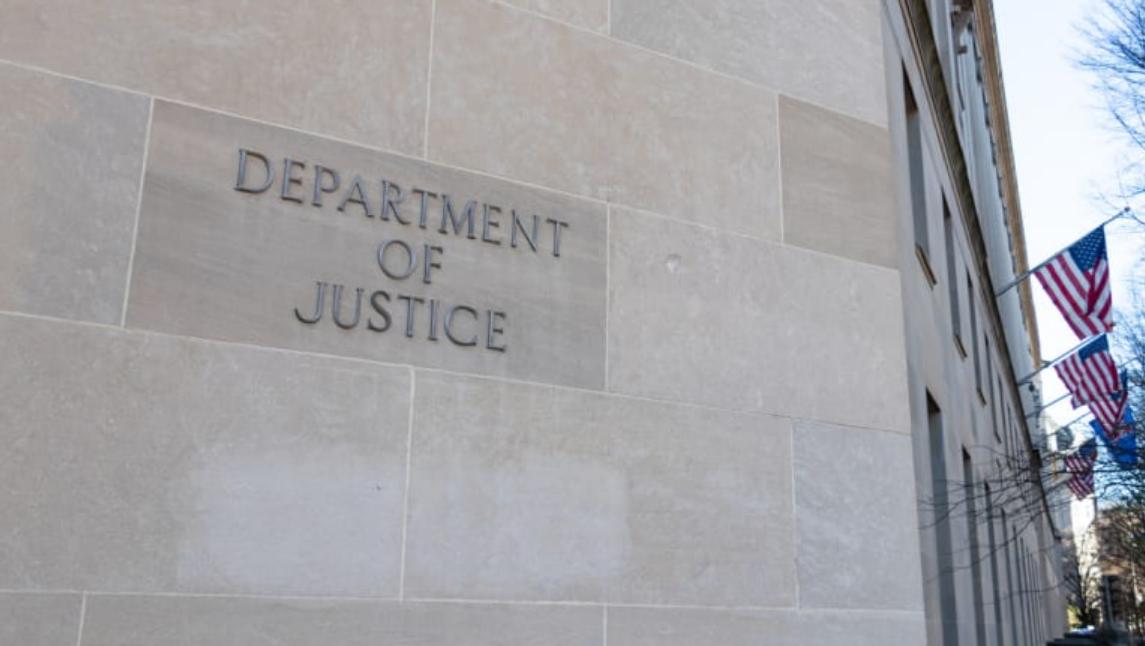
President Donald Trump is making good on his threat to punish California officials for allowing transgender female student-athletes to compete with cisgender girls in school sports.
On Wednesday, the U.S. Department of Justice announced it is suing the state’s Department of Education, claiming California’s policy to allow trans students to compete with other girls violates Title IX, the federal law that bans discrimination in education based on sex. The DOJ’s suit says California’s rules “are not only illegal and unfair but also demeaning, signaling to girls that their opportunities and achievements are secondary to accommodating boys.”
As the Washington Blade reported in June, this lawsuit follows a warning by the Trump administration to end the trans participation policy within 10 days or face referral to the DOJ as well as the loss of federal education funding.
And California may merely be the first to face legal action, according to U.S. Attorney General Pam Bondi, who warned that the 21 other states which permit trans girls to compete in female athletics could also face challenges by the federal government.
“If you do not comply, you’re next,” she said in a video posted on the DOJ website. “We will protect girls in girls sports.” Bondi was joined by Secretary of Education Linda McMahon.
The DOJ suit named California’s Education Department and the California Interscholastic Federation, the governing body for high school sports. A spokesperson for the CIF told the Associated Press the organization would not comment on pending litigation.
A spokesperson for Democratic Gov. Gavin Newsom deferred to the CIF and the Department of Education in declining to comment on the lawsuit since the governor was not named a defendant. But Newsom’s office told the AP that the Trump administration’s attacks on its policies protecting transgender athletes are “a cynical attempt” to distract from the federal government’s withholding of funds for all students who benefit from after-school and summer programs.
Newsom, however, has come under criticism — most notably by the Human Rights Campaign — for remarks he made in March, that allowing transgender athletes to compete in women’s sports was “deeply unfair,” as the Blade reported.
For more than a decade, California law has allowed students to participate in sex-segregated school programs, including on sports teams, and use bathrooms and other facilities that align with their gender identity.
But headlines about AB Hernandez, an out trans female high school student-athlete who won titles in the California track-and-field championships last month, drew condemnations from Assistant U.S. Attorney General Harmeet Dhillon, and President Trump himself.
Following the meet, Dhillon wrote in a letter to the California Interscholastic Federation that it violated the Equal Protection Clause of the Constitution by allowing trans girls to compete against other female athletes.
As for the lawsuit, DOJ claims California’s policies “ignore undeniable biological differences between boys and girls, in favor of an amorphous ’gender identity.’”
“The results of these illegal policies are stark: girls are displaced from podiums, denied awards, and miss out on critical visibility for college scholarships and recognition,” the suit says.
Last week, the U.S. Supreme Court agreed to hear two cases challenging state bans on trans student-athletes, as the Blade reported. More than 20 states have limited trans girls from participating on girls sports teams, barred gender-affirming surgeries for minors and required parents to be notified if a child changes their pronouns at school. More than two dozen states have laws barring trans women and girls from participating in certain sports competitions. Challenges to some of those policies are still being decided by courts across the country.
Back in February, the president signed an executive order that bans trans girls and women from participating in sports that match their gender identity, as the Blade reported.
Supporters of banning trans girls and women from competing include the conservative California Family Council, which has posted a petition online, arguing a ban would restore fairness in athletic competitions. Opponents like Equality California say bans are an attack on transgender youth.
“Local schools and athletic associations are the ones who should be handling these issues, and they are already creating policies that protect transgender youth and ensure a level playing field for all students. A federal ban that overrides those rules could require young girls to answer inappropriate personal questions or even be subjected to genital inspections by strangers if they want to participate in sports,” the organization said in a statement in February.
“The head of the NCAA, himself a former Republican Governor, recently told a U.S. Senate panel that he knew of less than 10 out transgender athletes among the 510,000 currently competing in college sports—less than .002 percent of all NCAA athletes.
“Studies confirm that participation in sports provides kids with invaluable life skills such as teamwork, leadership, discipline, and cooperation—fundamental lessons that every young person deserves the chance to experience. Beyond the field, sports also contribute significantly to students’ overall well-being, fostering better mental health, boosting academic performance, and enhancing self-esteem and confidence.”
California
Williams Institute reports impact of deportations on LGBTQ immigrants
Latest report suggests transgender, nonbinary and intersex immigrants face significantly higher safety risks
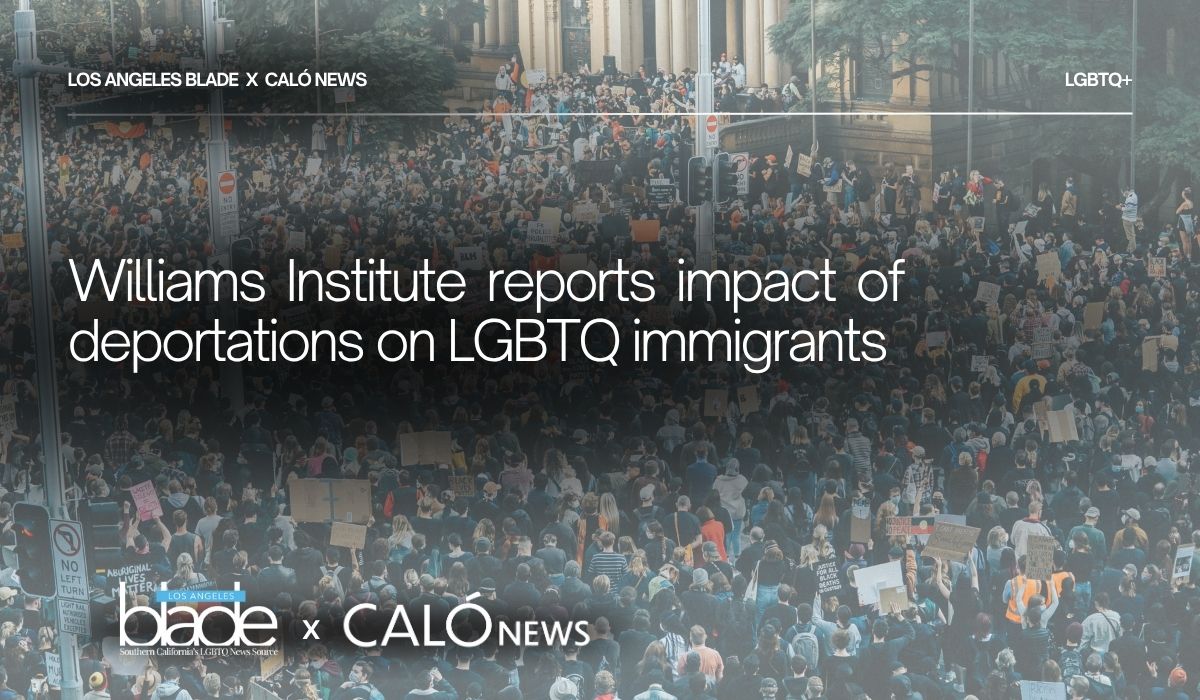
Williams Institute at UCLA has released its latest report, highlighting the intersection between LGBTQ and immigration issues and the impact of the U.S. Customs and Immigration Enforcement (ICE) raids across Los Angeles on LGBTQ people.
According to the brief, LGBTQ immigrants who hold legal status, but who are not naturalized citizens may also face challenges to their legal right to reside in the U.S.
Recent reports indicate that non-citizens with legal status are being swept up in immigration operations and several forms of legal status which were granted at the end of the Biden administration are being revoked. Those include: Temporary Protected Status (TPS) for some Venezuelan immigrants, as well as those from Afghanistan and Cameroon, while Haitian nationals are now facing shortened protection periods, by up to six months.
The Justice Department has proposed a new rule which grants the government border authority to revoke green card holders’ permanent residency status at any time. This rule is currently under review by the Third Circuit Court of Appeals, which could significantly affect non-citizens who are currently documented to reside in the county legally.
Supervisorial District 1, under Supervisor Hilda L. Solis, and Supervisorial District 2, under Supervisor Holly J. Mitchell would particularly be affected as it contains the city center of Los Angeles and nearly 29,000 LGBTQ, noncitizens would face the harshest impact. Those two districts contain many of the county’s historically Black, Latin American and Asian, Pacific Islander neighborhoods.
For transgender, nonbinary and intersex immigrants arrested or detained by ICE, there are additional impacts regarding how federal law defines biological sex and gender identity. The Trump administration has signed an executive order which redefines “sex” under federal law to exclude TGI individuals. This adds an extra thick layer of possible violence when TGI individuals are placed in detention centers or in holding that does not correspond to their identity.
According to the report, ‘transgender, non-binary, and intersex immigrants must navigate an
immigration and asylum system without information about how federal agents will respond to their gender identity and with the risk of greater violence if placed in detention centers, given the effects of this executive order.’
The brief estimates the number or foreign-born adults in Los Angeles County who will be potentially affected by the Trump administration’s executive orders on mass deportations.
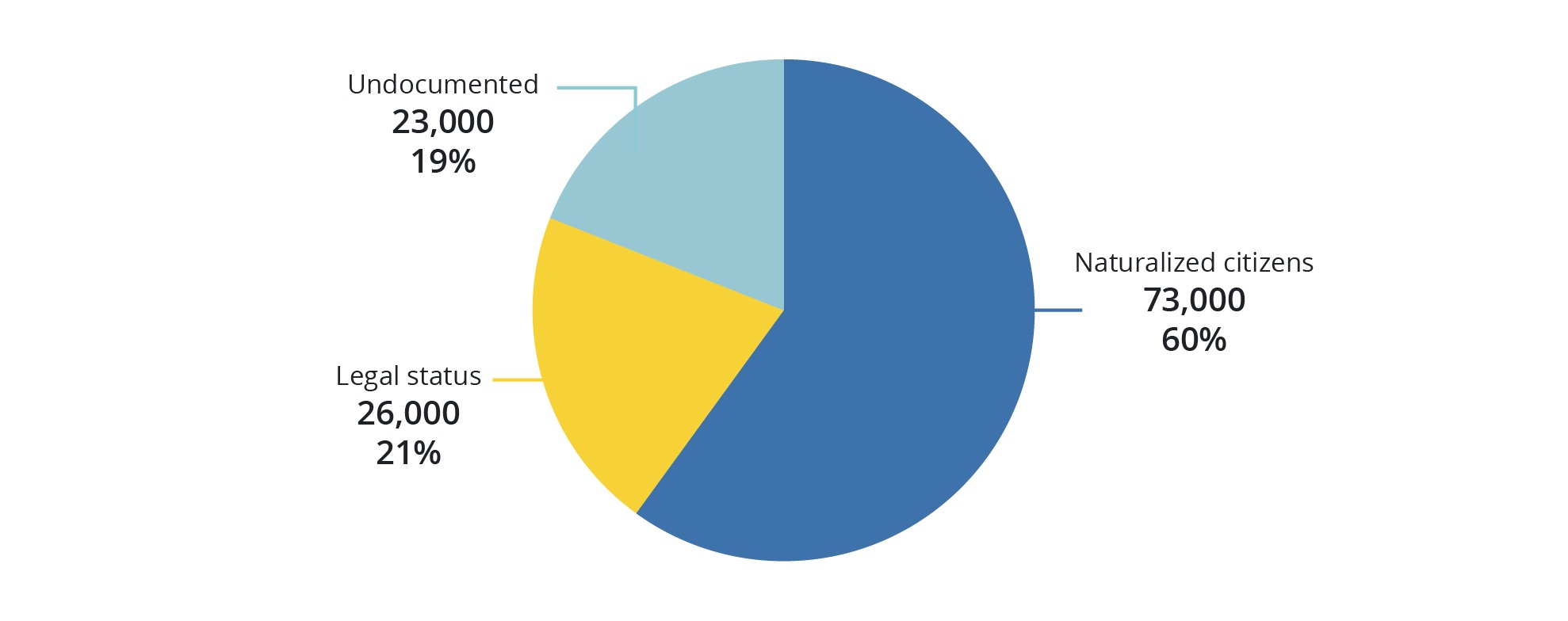
Graphic courtesy of Williams Institute at UCLA.
Using previous data from other Williams Institute Studies and reports from the University of Southern California Dornsife Equity Research Institute and data from the Pew Research Center, the latest brief states that there are over 1.35 million LGBTQ-identifying people across the U.S., with 30% of them residing in California.
The report further points to 122,000 LGBTQ immigrants who reside within LA County specifically, making Los Angeles County home to about 10% of all LGBTQ adult immigrants in the U.S.
While 18% of those Angelenos are foreign-born, only around 7%, or 49,000 of them do not hold legal status.
Using research from the Pew Center and applying an estimate, that means that there are approximately 23,000 undocumented LGBTQ across LA County and the remaining 26,000 LGBTQ immigrants in the county have some form of legal status.
Among the LGBTQ population of adult immigrants in California, approximately 41,000 are transgender or nonbinary. That figure also points toward approximately 5,200 of them residing in LA County. According to the proportions applied for this estimate, the Williams Institute approximates that around 3,100 transgender and nonbinary immigrants in LA County are naturalized citizens, over 1,100 have legal status and just under 1,000 are undocumented.
According to a brief released in February by the Williams Institute, ‘mass deportations could impact 288,000 LGBTQ undocumented immigrants across the U.S.
California
Trinity Park, a foundation of memories from childhood to present day
‘The park, in a sense, saw me grow up and helped me build a close sense of community at a time when I felt very alone and isolated’
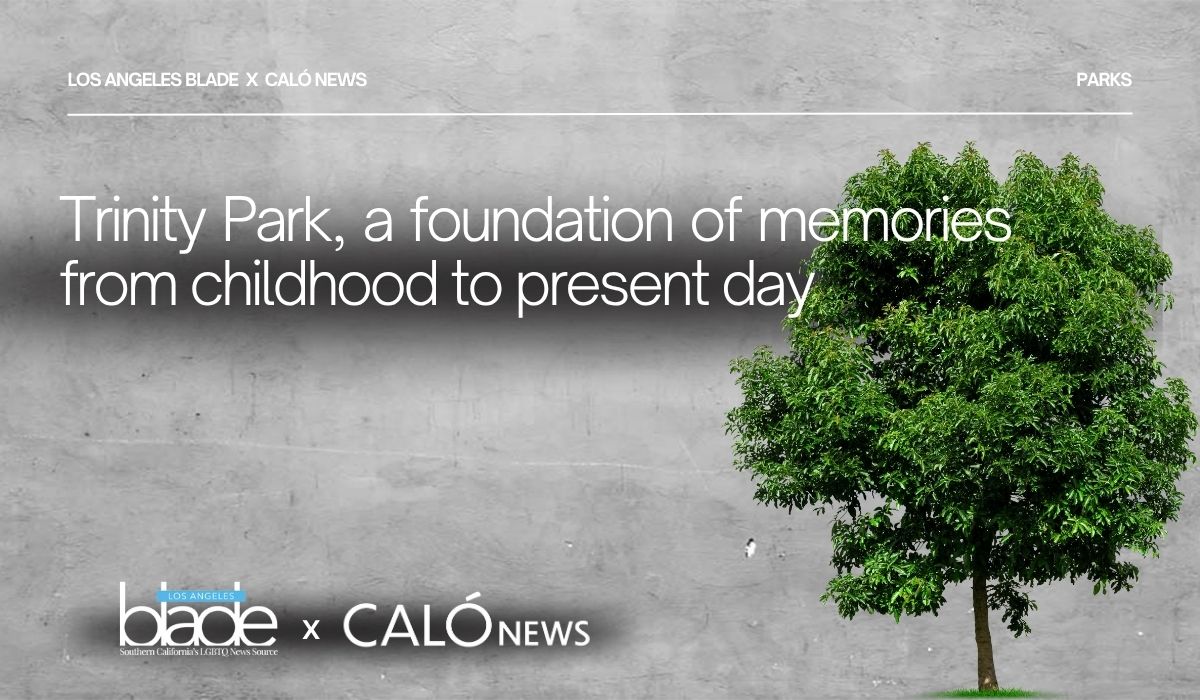
In the heart of South Central Los Angeles lies Trinity Recreation Center, known as Trinity Park, considered what some might refer to as a “hood staple.”
Although there is no denying the park’s history of gang-related incidents and even death, for many, the park is also a place full of profound memories, cherished as one of the only green spaces and gathering places within a community that is often underserved. The park sits in the city’s 9th Council District (CD-9), a district known for its lack of green spaces.
South Central L.A. is often characterized by an over concentration of liquor stores and a lack of quality, affordable grocery stores and sit-down restaurants, contributing to high rates of heart disease, diabetes and premature death among South L.A. residents.
For me, the park brings me back to a time when life was easier. It was the place where I made my first friend. This park was my large family’s front yard for over three years and a place that I have passed by and walked through for over two decades.
Trinity Park was one of the first places I have memories of. A year after my family immigrated to the U.S., we moved into a three-bedroom house across the street from the park. The first year in the states was difficult for my mother, who juggled two jobs.
For me, understanding very little English and not being able to speak it made it extremely difficult to communicate or connect with other kids and adults at school. My thick accent was always a point of concern and embarrassment.
Trinity Park, which in the early 2000s was even more notorious for crime and shootings, was a special place for my family and me during the almost three years that we lived neighboring it.
When my mother worked long hours, my aunts and uncles would take me to the park at least twice a week, where I would run uncontrollably and ride the swings for as long as possible. The park, in a sense, saw me grow up and helped me build a close sense of community at a time when I felt very alone and isolated.
That, too, is what the park has been to many of the kids and community living in the park’s surroundings. Trinity Park, is also located 12 minutes from downtown L.A., in an area of South Central L.A. known as Historic South Central within CD-9, where the majority of the population is composed of Black and Latino working-class families.
The Trinity Recreation Center opened its doors in 1968. In the last few years, there have been significant upgrades and additions to the park, including the 2016 opening of a synthetic soccer field and a skate park, which officially opened in 2021.
To what to many outsiders might look like an unsafe and unpredictable piece of land, Trinity Park holds dear memories for many of those who have passed through or hung out in the park at some point in their lives.
The park was also where I remember making my first true friend in L.A., a friendship that wasn’t sparked because we went to the same class or because our parents knew each other, but because of a simple connection between kids while playing. I don’t remember her name, but the photo below was taken the day I met her at Trinity Park.
My mother, on one of her only days off, had taken me to the park. It was the summer of 2004 and we arrived at the park close to sunset. I wish I could recall more than us playing tag and running around the park, but I remember the feeling of making my first friend, one I had made on my own. We probably spent three to four hours together that day playing and at the end of it all, my mother ran across the street to bring her camera. I think she, too, wanted to preserve the memory, the feeling of seeing her daughter connect with another kid after what had been a very tough time in both of our lives.

Brenda’s friend she made in Trini Park (L) and Brenda (R) pose together at Trinity Park in 2004.
(Photo courtesy of Brenda Fernanda Verano)
That was also the park where I taught myself to ride a bike and that gave me confidence, something that was hard for me to find as a kid.
Later in life, although we moved out of the home across the street from the park, my family and I continued living in that same neighborhood and all throughout my high school journey, I walked through that park every day to get to school. In middle school, the park was also a meetup place for my friends and me after school, where we would hang out and share music playlists.
The park has been a silent but consistent entity from childhood to now — adulthood — always in the background of pieces and times in my life.
EDITORS NOTE: This article was published through the Bezos Fellowship grant provided by the Ethnic Media Services, which recently changed its name to American Community Media. The article was written by Brenda Fernanda Verano, an award-winning journalist and reporter for CALÓ News, a local non-profit newsroom focusing on the Latin American community of Los Angeles.
Breaking News
ICE raids cause civil unrest in Los Angeles during Pride month
Thousands of National Guard members and Marines are now being deployed to Los Angeles with intention to occupy for the next 60 days

ICE raids have taken place across Los Angeles County over the last few days and tens of thousands of Angelenos have taken to the streets to protest against the raids and the police brutality involved in the arrests.
The Trump administration has threatened to arrest Governor Gavin Newsom and L.A. Mayor Karen Bass if they were to interfere with the ICE raids. In response, California has now filed a lawsuit against the Trump administration.
Early Monday morning, the U.S. Northern Command announced that it activated around 700 Marines, after the Pentagon and the Trump administration deployed around 2,000 National Guard troops to Los Angeles over the weekend. As of today, Trump has deployed double the amount of National Guard troops and ICE raids are said to continue for the next 30 days. The deployment is set to cost $134 million and last 60 days or more according to Secretary Pete Hegseth and a senior defense official.
Reporters have been hit with rubber bullets, batons and have been tear gassed while trying to document the protests. There are eyewitness reports and video footage showing police officers trampling people over with horses, running people over with squad cars and detaining people who have legal status.
In a broadcast interview with CNN, Mayor Bass stated that she believes that if ICE raids hadn’t happened on Friday, we would not be seeing the type of disorder we are seeing. The Los Angeles Police Department declared Downtown L.A. an unlawful assembly area after union president David Huerta was detained by ICE along with several undocumented immigrants. Huerta appeared in court on Monday and was released on a $50,000 bond.
LAPD Chief Jim Donnell says they have adapted their tactics to arrest people, but that they are ultimately “overwhelmed” by the number of protesters.
“We have adapted our tactics to take these people into custody and to be able to hold them accountable,” said Chief Donnell. “We are overwhelmed as far as the number of people out there engaged in this type of activity,”
Mayor Bass said she was “completely in sync” with what the police chief stated, adding that she believes there is enough video footage to prosecute protestors even if they did not get arrested on scene.
“Some people might think that just because they haven’t gotten arrested on the spot, that they’ve gotten away with it and the message I would send is: there’s ton of video tape and people who didn’t get arrested today for committing violent acts — don’t plan on the fact that you get off because you can get arrested in the next few days,” said Mayor Bass.
Mayor Bass doubled-down on her statement regarding the ICE raids and how L.A. is a city of immigrants and ICE raids will continue to affect the local economy.
There have also been reports that ICE raids are taking place across schools and graduation ceremonies.
Los Angeles Unified School District is set to deploy school police to set up safe zones around graduations and school campuses amid these raids targeting celebrations. According to the LA Times, school police will patrol and guard campus entrances when ICE and Border Patrol are seen in the area. Graduation ceremonies will become sanctuaries for families until immigration agents disperse from the area.
Medical providers like St. John’s Community Health released a statement on the issue.
“The aggressive increase in ICE activity is forcing already vulnerable people to fear going to the doctor, school, or even the grocery store — and putting countless families in danger,” said Jim Mangia, president and CEO of St. John’s Community Health.
Community leaders like Tony Hoang, executive director at Equality California stated that as a child of immigrants, it deeply saddens him to see the ICE raids take place across Los Angeles.
“Equality California joins Governor Newsom and Attorney General Bonta in calling for an end to National Guard deployment. We condemn the raids that have occurred and are continuing, which are xenophobic and traumatizing to families, individuals, and communities,” he said.
“We stand in solidarity with immigrant communities across Los Angeles and the state—and we call on every leader, at every level of government, to reject this assault on our values and take urgent action to protect those under threat.”
California
New California trans athlete policy creating ‘co-winners’ is a crock
You didn’t misread that. Hernandez shared the podium with ‘co-winners’

A lot happened at last weekend’s high school state track and field championship meet in
Clovis, Calif. Parents of cisgender student-athletes booed the one and only transgender
girl competing. Police and security officers showed up in large numbers to keep
protestors apart and safeguard the competitors. Police made an arrest outside the
stadium after a demonstrator brandishing a transgender pride flag allegedly assaulted a
man described as a conservative activist and caused damage to his vehicle.
The trans student — 16-year-old AB Hernandez — finished a winner. But she wasn’t “the” winner.
As CBS News reported, “Hernandez took home first place medals in both high jump and
triple jump and she placed second in the long jump event. Following a rule change by
the California Interscholastic Federation, a co-winner was named in each of the three
events in which Hernandez placed.”
You didn’t misread that. Hernandez shared the podium with “co-winners.”
As the Blade reported last week, the CIF introduced a new “pilot entry process” that for
the first time, allowed judges to score trans athletes separately from cisgender
competitors, so there were three winners in every event: a cisgender male winner, a
cisgender female winner and a trans student-athlete winner.
The new policy was announced hours after President Donald Trump threatened to pull
“large scale federal funding” from the state if officials allowed trans athletes to compete
according to their gender identity.
Despite the policy change, the U.S. Department of Justice announced on social
media it was investigating State Attorney General Rob Bonta, State Superintendent of
Public Instruction Tony Thurmond, the Jurupa Unified School District, and the CIF for
potential violations of Title IX, as the Blade reported.
So what happens now? As KXTV reported, President Trump issued another threat to
pull funding on Monday in a post to his Truth Social account, not naming Hernandez but
labeling her “a biological male” and using his favorite derogatory nickname for
California’s Democratic Gov. Gavin Newsom.
“A Biological Male competed in California Girls State Finals, WINNING BIG, despite the
fact that they were warned by me not to do so. As Governor Gavin Newscum fully
understands, large scale fines will be imposed!!!”
Now, the pundits are weighing-in. Sara Pequeño wrote in USA Today how she was
encouraged to see Hernandez share the 2nd place podium with Brooke White and “put
their arms around each other.”
“They’re setting an example for how all of us should treat our trans neighbors, i.e.,
treating them like human beings, not enemies,” she wrote.
As Pequeño noted, Save Women’s Sports, an anti-trans advocacy group, could only
identify five trans students in the entire United States who were competing on girls’
teams from kindergarten through grade 12 in 2023. “That group’s entire existence is to
hate trans athletes, and they found very little to hate,” she wrote.
According to the president of the NCAA, there are fewer than 10 student-athletes
who publicly identify as transgender out of the more than 500,000 competing at the
collegiate level.
Pequeño was not alone in finding joy in the rules change that brought cisgender and
transgender girls together on a podium, each of them a “co-winner.” So did self-
proclaimed “trans advocate” Cyd Zeigler.
He’s one of the co-founders of the LGBTQ+ sports site Outsports, who in 2023
infamously came close to endorsing Florida Republican Gov. Ron DeSantis for
president, only to offer his regrets, following a backlash from readers. Zeigler penned an
op-ed Wednesday originally titled “California trans athlete policy is something everyone
can embrace.”
“Everyone?” Not this sports editor.
He called the new CIF policy “the best possible path in 2025 to trans participation in
sports.”
In celebrating this change, Zeigler also trashed “goal-post-moving trans advocates” and
policies in California and Connecticut that allow “a trans girl to run in boys track meets
and, without a medical transition, later compete in girls meets,” meaning high school
competitions. “That’s bad policy,” declared Zeigler without evidence.
That policy in Connecticut has stood since 2011 and is enshrined in state law, and so far
has withstood legal challenges once again being heard in federal court.
Outsports at some point changed the headline of his screed to “New California trans
athlete policy is something we can embrace” and apparently made another significant
choice: Despite quoting the outlet’s one and only remaining transgender contributor,
Karleigh Webb, who opposes the rules change, Zeigler did not mention her by name.
Why?
In an article published before the championship, Webb wrote: “If AB Hernandez wins,
why should she have to share the spoils with someone else if’s not a tie? That’s what
professional transphobes like Jennifer Sey and Riley Gaines try to sell. Awarding a
duplicate medal gives their nonsense credence to the detriment of the sport and the
athletes.”
Webb is right. Zeigler and the CIF and Gov. Newsom are wrong. You either win, or you
lose, or if you prefer, you come in second, third, whatever. But “co-winners?”
That’s a crock.
Imagine if the Dodgers and Yankees shared the World Series trophy. Why shouldn’t the
49ers also win the Super Bowl alongside the Chiefs? Maybe Kamala Harris should be
declared a “co-winner” of last November’s election?
Personally, I’m glad to see Hernandez embraced by her cisgender peers. I’m relieved to
know that crowds cheering these amazing girls last weekend drowned out the hecklers
who showed up to boo a child. I’m encouraged that even if she had to share the win,
Hernandez was given her rightful place among the teens competing and proved she
was not only worthy of competing but did not win in every event.
So, she’s hardly “unbeatable.” Most trans athletes actually lose, as Zeigler wrote almost
six years ago, back before he started echoing anti-trans inclusion activists Martina Navratilova, Renee Richards and Nancy Hogshead-Makar.
If he really thinks the CIF “co-winners” rule is going to silence anti-trans forces, I think
he’s going to be very surprised by Riley Gaines and her crowd.
While it’s easy for Zeigler to concede public opinion has shifted, he should know
better than to blame those who pushed for inclusion, when it’s clear that conservative
voices in media and politicians, like his, are the ones responsible for influencing that
move to reject trans women’s right to compete in women’s sports. It’s a pendulum swing
that in time will undoubtedly swing back, once the science proves that trans women and
girls don’t always win. In fact, researchers have already proven some trans athletes are
at a disadvantage compared to their cisgender competitors.
Just as Parker Molloy reported that a Republican-commissioned study on gender
affirming care in Utah actually found “that youth who received care before age 18 had
better outcomes, especially around depression, anxiety and suicidality. Hormonal
treatments were associated with positive mental health and psychosocial functioning
outcomes.”
I believe the science is on the side of transgender Americans. Americans love a
winner. Not a “co-winner.”
Breaking News
Controversy brews in the City of Glendale over support of Pride event
Republican Mayor Ara Najarian pushes back on funding family-friendly Pride event
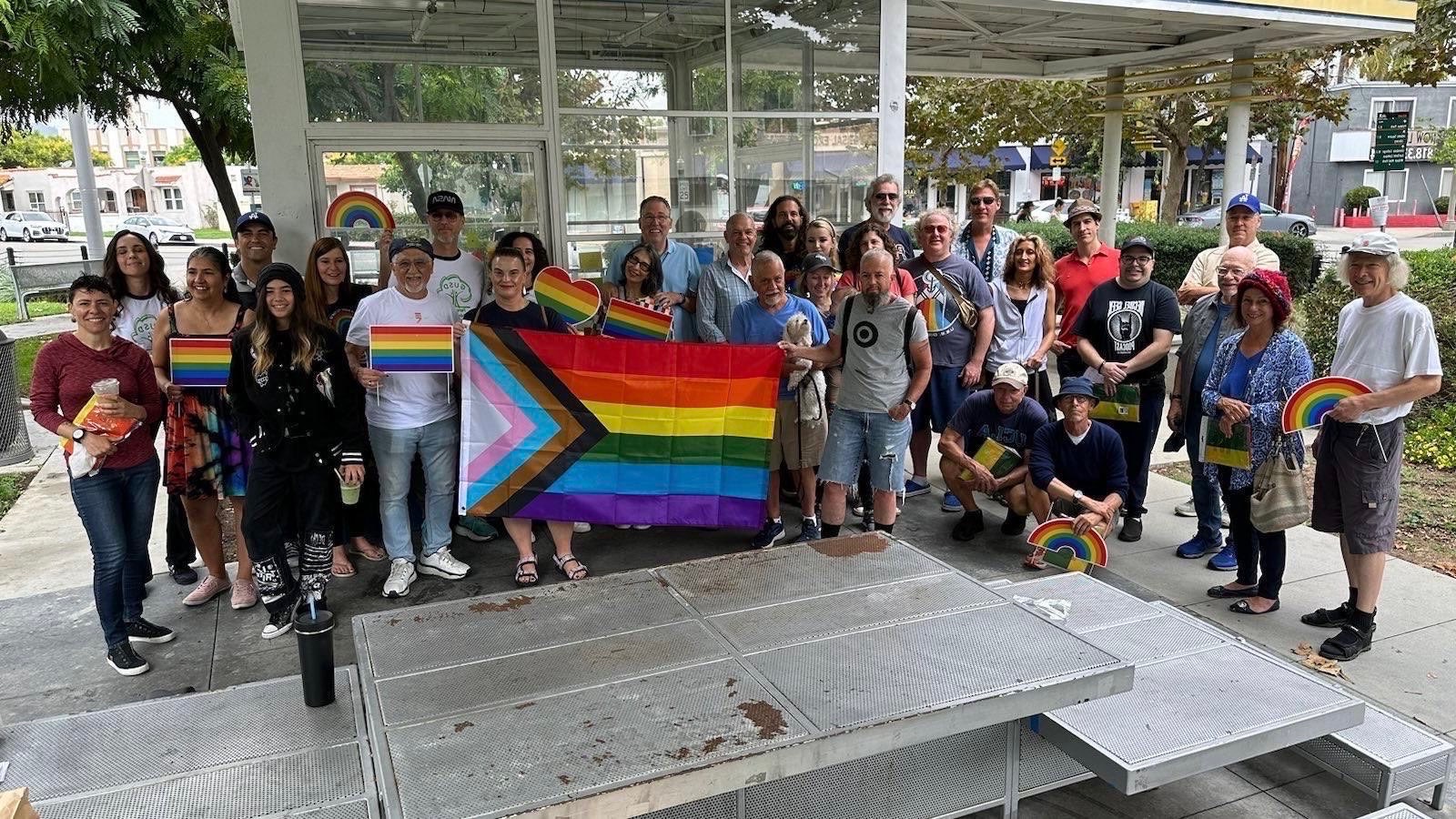
Over the last three weeks, glendaleOUT — a local LGBTQ group based in Glendale, California and city leadership have been at odds over securing financial support of a family-friendly Pride event set to happen on Saturday, June 7. As of Tuesday, Glendale’s city council voted 3-2 in favor of funding the event, ending a weeks-long argument over securing the funds.
The controversy began when the group highlighted how neighboring cities have visibly demonstrated support for Pride Month celebrations across the county, while the City of Glendale has yet to sponsor events with banners, city logos and financial sponsorship.
Councilmember Dan Brotman proposed $5,000 in sponsorship funds, noting that the city has funded other cultural events with much larger amounts.
Local leaders, but specifically Mayor Ara Najarian — who was just re-elected for a fifth term — are pushing back and opposing the proposal for funding. According to sources, Mayor Najarian openly opposed the proposal, stating a distant conflict of interest as the reason for the opposition.
LGBTQ advocates have been quoted as saying this is a “bad-faith political tactic, not grounded in any real conflict of interest.”
The next potential vote is expected to happen today at a city council meeting. Organizers say that the Pride event will happen regardless, but that they still hope to shed light on the patterns of sexual orientation-based discrimination in the city council.
For more information about the free community Pride event, visit glendaleOUT’s website.
California
LA County officially kicks off Pride Month with blessing from The Sisters of Perpetual Indulgence
‘This needs to be done, because once again, our county and our nation houses people who want us gone, who wish us harm’
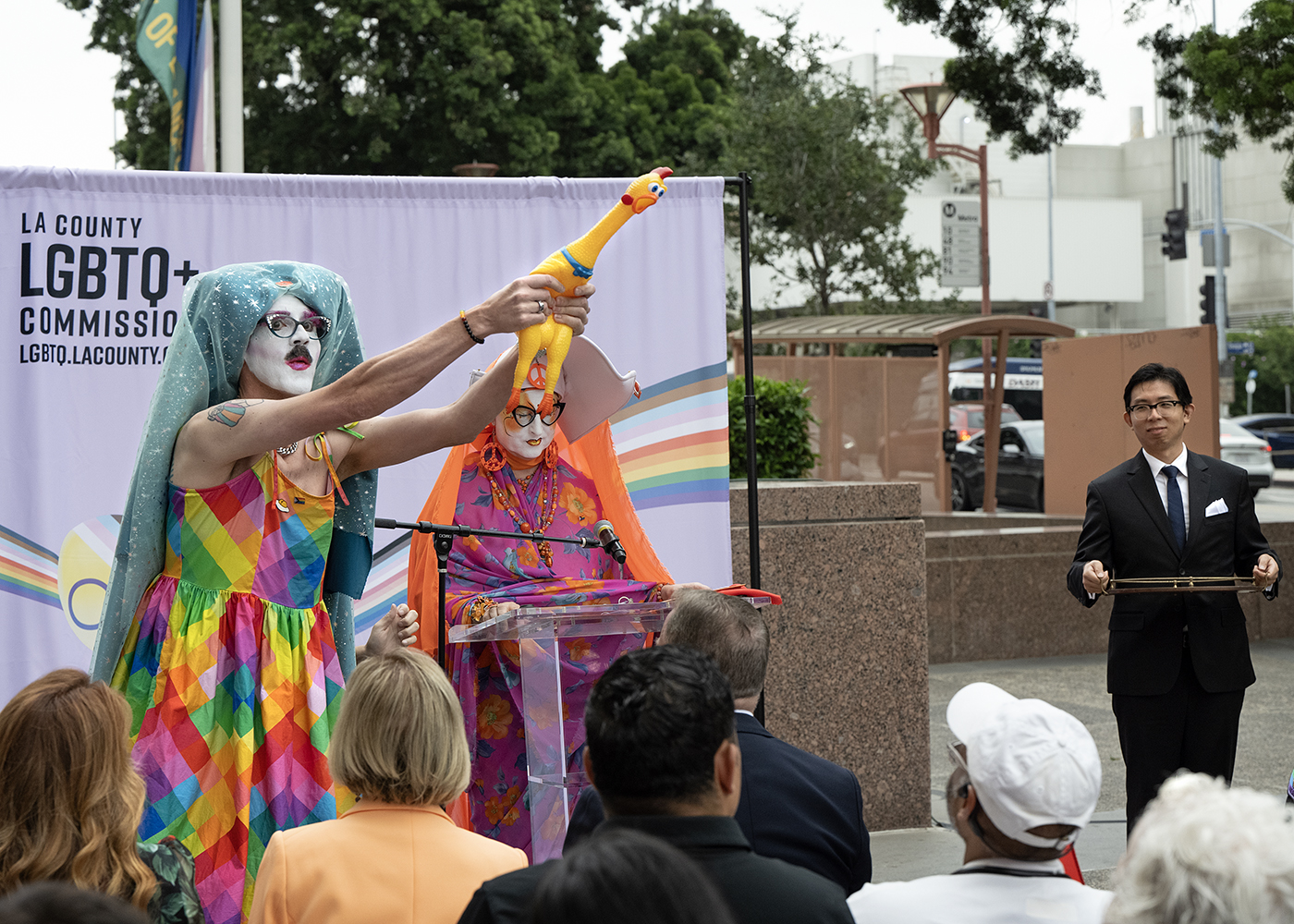
The LA County Board of Supervisors and the LA County LGBTQ+ Committee gathered on Tuesday, June 3, to officially kick off Pride Month across the county with a blessing from The Sisters of Perpetual Indulgence, who purified the space with their sacred chicken, then led everyone in blessing the Progress Pride flag before raising it at the Kenneth Hall of Administration.
“By raising this flag, the emblem of our souls and of our souls, of our love, of our survival, and of the gifts we offer to every Angeleno in this county — you all declare and you declare to everyone both here and abroad, that we are your people and you affirm that this is our home too,” said Sister Unity. “This needs to be done, because once again, our county and our nation houses people who want us gone, who wish us harm.”
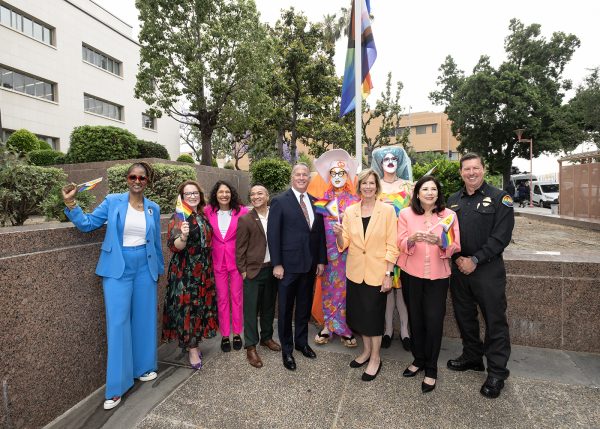
LA County Supervisors and other community leaders gathered on Tuesday at the Kenneth Hall of Administration to raise the Progress Pride flag in honor of Pride Month. (Photo credit to Diandra Jay)
Supervisors Janice Hanh, Holly J. Mitchell, Lindsey P. Hovarth and Hilda L. Solis spoke on the importance of representation in the face of discrimination, homophobia and transphobia.
Supervisor Hahn mentioned in her speech that her father, Kenneth Frederick Hahn designed the LA County flag and it was clear to her that he believed that a flag was more than just a piece of fabric.
“My dad, the original Supervisor Hanh, designed the LA County flag and he understood that a flag is not just fabric. A flag is a symbol. It’s a visual representation of who we are, what we value and what we stand for.”
Two years ago, Supervisor Hahn started the tradition to raise the flag alongside the one her father designed and then it was Supervisor Horvath who suggested that the Pride flag be flown on all county facilities across Los Angeles.
“Now, in every corner of our vast county — from our lifeguard stations on our beaches, to every library, fire station — and may I add: all eight county buildings in the city of Downey. Wherever there is a county facility, the Progress Pride flag will send a clear, powerful message to our LGBTQ residents: ‘your county government unequivocally and unapologetically has your back.’”
The comment about the city of Downey is in regards to a controversial Pride flag ban that was enacted last year.
Supervisor Hahn then introduced LA County Assessor Jeff Prang, one of the longest-serving, out, elected officials in the state of California. Due to his long history in government and as a member of the LGBTQ community, Assessor Prang helped launch the LA County LGBTQ Elected Officials Association with over 50 active members from all levels of government.
“We are in a moment of crisis in the nation. Across the country, an extremist movement is working to dismantle LGBTQ rights — from banning books to criminalizing gender-affirming care, to silencing drag performers, to targeting our youth and families with cruelty disguised as policy,” said Assessor Prang. “These are not isolated incidents, this is a campaign of fear and repression.”
Héctor Trinidad-Plascencia, the Chair of LGBTQ+ Commission, encouraged attendees who are not from the queer and trans communities, to remove the blockages that keep them from being in solidarity with queer and trans people.
“With your solidarity, we are creating a different world together starting in our county home and for the nation to follow,” they said.
a&e features
Cumbiatón returns to Los Angeles right in time for Pride season
‘Que viva la joteria,’ translates roughly to “Let the gayness live”

Healing and uplifting communities through music and unity is the foundation of this event space created by Zacil “DJ Sizzle Fantastic” Pech and Norma “Normz La Oaxaqueña” Fajardo.
For nearly a decade DJ Sizzle has built a reputation in the queer POC and Spanish-speaking undocumented communities for making the space for them to come together to celebrate their culture and partake in the ultimate act of resistance — joy.

Couples, companions, comadres all dance together on the dancefloor at Cumbiatón. (Photo courtesy of Cumbiatón).
Cumbiatón was created during the first Trump administration as a direct response to the erasure, racism, homophobia and xenophobia that was engrained into the administration’s mission for those first four years. Now that the second Trump administration is upon us, the racism, homophobia, transphobia and xenophobia are tenfold.
This event space is a ‘party for the hood, by the hood.’ It is led by women, queer and trans people of color in every aspect of the production process.
The recent fires that burned through Altadena and Pacific Palisades made DJ Sizzle decide to step back from marketing the event in Los Angeles, an area where people had just lost their businesses, homes and where their lives were completely thrown for a loop.
Now they’re back, doubling-down on their mission to bring cumbias, corridos and all the music many of us grew up listening to, to places that are accessible and safe for our communities.
“I started Cumbiatón back in 2016, right after the election — which was weirdly similar because we’re going through it again. And a lot of us come from the Deferred Action for Childhood Arrivals (DACA) movement. We were the ones to really push for that to happen along with the DREAM Act.”
DJ Sizzle says that she wanted to create a space out on the streets to celebrate life and come together, because of how mentally and physically taxing it is to be a part of the marginalized communities that were and still are, a major target for ongoing political attacks.

Edwin Soto and Julio Salgado pose for a photo at a Cumbiaton event in 2024. (Photo courtesy of Cumbiatón).
“We need these spaces so that we can kind of refuel and rejoice in each other’s existence,” said DJ Sizzle. “Because we saw each other out on the street a lot, but never did we really have time to sit down, have a drink, talk, laugh. So I found that music was the way to bring people together and that’s how Cumbiatón got started. It was honestly like a movement of political resistance through music.”
DJ Sizzle is an undocumented community organizer who aims to not only bring awareness to the issues that her communities face, but also to make space to celebrate the wins and bond over the music that brings people in Latin America, East L.A., Boyle Heights and the Bay area together.
Julio Salgado, a queer, visionary artist and migrant rights activist from Ensenada, Baja California with roots in Long Beach and the Bay Area, connected with DJ Sizzle over their shared passion in advocating for immigrant rights.
“Cumbiatón was created during the first [Trump] administration, where you know, a lot of people were really bummed out and so what Sizzle wanted to create was a place where people could come together and celebrate ourselves,” said Salgado. “Fast-forward to the second [Trump] administration and we’re here and feel a little bit more like: ‘oh shit, things are bad again.’ But, things have always been bad.”
Salgado is involved with Cumbiatón through his art. He is a mixed-media artist who creates cartoons using his lived experience with his sobriety journey, undocumented status and queer identity.
With a background in journalism from California State University, Long Beach, Salgado documents what activists do in the undocumented spaces he has been a part of throughout his life.
In 2017, Salgado moved back to Long Beach from the Bay Area, and at the time he started doing political artwork and posters for protests against the first Trump administration, but because the nature of that work can be very tiring, he says that he turned to a more uplifting version of his art where he also draws the joy and unity in his communities.
When he and Sizzle linked up to collaborate during that time, he thought he could use his skills to help uplift this brand and bring it to the forefront of the many events that saturate the party landscape.

DJ Sizzle doing her thing on stage, giving the crowd the music they went looking for. (Photo courtesy of Cumbiatón).
“We are familiar with using the dance floor as a way to kind of put the trauma a little bit away just for one night, get together and completely forget,” said Salgado.
Coming from an undocumented background, Salgado and Sizzle say that their experience with their legal status has made them very aware of how to go about the ID-check process at the door for their events.
“When you’re undocumented, you have something called a [High Security Consular Registration (HSCR)] and it’s kind of like your ID and many of these heterosexual clubs would see that and say it was fake,” said Salgado. “But at the gay club, they didn’t care.”
Just being conscious of what that form of ID looks like and knowing that it’s not fake, helps many of the hundreds of people who come through for Cumbiatón, feel just slightly more at ease.
Edwin Soto, who is another community activist and leader in the undocu-queer community, is also involved in the planning and organizing of the event.
In the long journey of making Cumbiatón what it is now, they say that they have all been very intentional about who they bring in, making sure that whoever they are, they also understand the experience of being undocumented and accepted anyway.
“Something that Sizzle and the team have been very intentional about is making sure that [the security at the door] knows that someone might be using their consulate card,” said Soto.
Bringing together this event space is no easy task, considering the fact that their events are deeply thought out, intentional and inclusive of not just people of color, but also people with differing abilities and people who do not reflect the norm in West Hollywood clubs.
“We created the space that we were longing for that we did not see in West Hollywood,” he said. “[Cumbiatón] is what life could really be like. Where women are not harassed by men. Where people are not body-shamed for what they’re wearing.”
When it comes to their lives outside of Cumbiatón and partying, Sizzle says that it does get exhausting and planning the event gets overwhelming.
“It is really difficult, I’m not going to lie,” said DJ Sizzle. “We are at a disadvantage being queer and being undocumented because this administration triggers us to a point that, anyone who is not a part of those identities or marginalized communities would ever be able to understand,” said Sizzle. “There are times where I’m just like: ‘I’m going to cocoon for a little bit’ and then that affects the marketing and the communication.”

Usually, the events bring in hundreds of people who are looking for community, safety and inclusion. (Photo courtesy of Cumbiatón).
That’s a little bit about what goes on behind the scenes — which really shouldn’t come as a surprise for anyone who is out there fighting for basic human rights, while also making the space to party and enjoy themselves.
“I’m really trying to find balance and honestly my life raft are my friends and my community,” she said. “Like, being able to share, being able to have this plática, and be like ‘bitch, I see you and I know its fucked up, but we got each other.’”
Cumbiatón was made with the purpose of making space to include and invite the many different people in these communities who are otherwise sidelined in broader conversations and in party scenes where they are not as inclusive or thoughtful about their attendees.
“How beautiful is it to be queer and listen to rancheras and to norteñas and cumbia, and to just own it,” said Soto.
To join Cumbiatón at their next party, visit their Instagram page.
a&e features
Frankie Grande is loud and proud this WeHo Pride
Frankie Grande will be hitting the stage at this year’s Outloud Music Festival at WeHo Pride and is ready to bring the party

Among other queer and ally big names like Lizzo, Alyssa Edwards, Kim Petras and Frankie Grande will be taking center stage on Saturday, May 31, at this year’s OUTLOUD Music Festival at WeHo Pride. In the wake of the queer community’s current political strife, Grande is taking the spotlight, unapologetically and ready to bring the party, celebrating activism and sexuality unabashedly.
Hot off the heels of his recent two hit singles, “Rhythm of Love” and “Boys,” Grande is gearing up for the release of his new album, Hotel Rock Bottom, hitting platforms on June 27. The album is bringing queer aesthetic to the pop genre and is a retelling of Grande’s life as he has gone from party boy to stage, screen, and reality TV personality, to getting married and living a sober family life (dog and all).
We sat for a chat with Grande as he prepares for his WeHo Pride extravaganza. With everything socially and politically considered, Grande is not holding anything back this Pride season.
Pride is recharging and gearing up for battle. I feel like we’re in a place where our community is under attack, and this is the time where we get the microphone so recharge and get ready to be loud and be prouder than we ever have before. We need to show the world that we are not to be fucked with. We got the mic, so let’s use it.
No stranger to taking the stage, Grande promises a spectacle for his Outloud appearance.
I’m so excited. I’ve put so much effort into crafting a very beautiful show, a very gay show, a very hot show. I’ve selected some really fun songs from my album that people are going to get to hear for the first time because the album won’t be out. I’m also doing some fun and clever covers of songs that have inspired me. I’m excited that I’ve mixed it up and it’s going to be really fun and really gay.
This Pride, Frankie’s call to the gay community is clear.
Support our trans siblings. It is more important than ever. Go to your trans friends and be like, “Hey, what do you need? And how can I help?” Because they’re the ones who are directly being scapegoated at this moment. To think that it’s happening to them means it’s not happening to you is crazy. We are all part of the same community. We’re all under the rainbow umbrella, so let’s go support the community that is directly under attack right now.
Grande’s album comes at a time when queer folk could use a little levity and party attitude. He has been a long-time spokesperson for the LGBTQ community. He has used his platform from reality TV to his role as GLAAD board member to incite activism. He knows full well the fatigue that many of the queer community face as we continue to resist a brutal Presidential administration.
You have to find moments of joy. Honestly, that’s a lot of what this album is to me. It’s like, let’s dance around and bop and be silly to boys tonight so that we can hit the ground running tomorrow and go get some legislation overturned. My whole life, I’ve turned to the dance floor during times of stress, and I think we do need to do that. We have to go celebrate. We have to remember why it is so fun to be a huge homosexual and what we’re fighting for. But then we need to go fight. Don’t get so fucked up that you have to be in bed for three days because we actually do need to go to work.
Grande has also become the poster boy for sober party gays. Celebrating 8 years of sobriety, he has been very open about his journey and how it fits into gay culture. Being openly sober has gained momentum in the queer community and many Prides now include dry events. Grande knows the triggers that Pride can include and has some advice to his fellow sober folk.
First of all, sober gays are fun gays, let’s just say that. If you’re triggered, get the fuck out. You know? There are a lot of drugs, there’s a lot of drinking, there’s a lot of partying, and sometimes you’re just not fully ready to be in those environments. And if that is true, then just leave. The people who are drinking and using will have no idea that you left.
Also go find some sober friends to go with. I did everything in sobriety, like linked with my sober BFFs, Salina EsTitties and stylist Mandoh Melendez. They were my bodyguards and they were my shield, and they had more sobriety than I did. They showed me the ropes, and to this day, they’re still sober and my best friends. So, get a sober buddy and GTFO when you’re triggered, just leave.
Grande is being very vulnerable in his upcoming album Hotel Rock Bottom. Not only is he leaving himself to be compared to other family members in the business, but he is also telling his story on his own terms with music. What is his intent with his album?
My mission with this album is to inspire others to be themselves by being so open and honest. If you just want to listen to the surface value of my album, then you’re going to have a great fun dance time being like, this is so much fun. But if you want to actually go and listen to the lyrics and dissect it, you’ll see that there’s a lot of darkness and a lot of light on both sides of this album. I organized this album into side A and side B, or top and bottom, as we’re calling it on the vinyl. There’s sobriety and using days, there’s good and bad, and highs and lows on both. So, no judgment, it’s all about just be yourself, live your life, live authentically, and you’re going to get through whatever you’re dealing with.
And his message to the queer LA community this Weho Pride?
We’re very privileged and we’re very blessed because we’re in a very liberal and very blue state, so we need to have the best time and show up. But let’s make sure that we’re constantly beaming our love, light, and energy, and thinking about how we can help people in red states who are not going to have a governmentally and a community-supported Pride, because that is a reality these days. Let’s try to figure out how we’re going to help the country while we’re in the most liberal, most protected state in the world, which is fabulous.
Catch Grande onstage at Outloud on Saturday, May 31st. Hotel Rock Bottom will be released June 27th, available wherever you stream your music.
California
New sapphic social club comes to West Hollywood
BBGRL Club debut night brings in full house with Niña Dioz performing live alongside local pop star BBGRL

BBGRL, formerly known as Dom, is an upcoming ethereal pop artist and visionary behind BBGRL Club — the femme-forward collective that aims to celebrate sapphic joy through music, performances and futuristic self-expression. Her pop sound blends synths, intimate vocals and Y2K nostalgia to build a unique experience for her audience.
BBGRL Social Club was born out of the idea that there needs to be more events for lesbians and sapphics in the City of Los Angeles. A city well-known for its vibrant and populous queer and trans community, struggles to make space for the many sapphics that inhibit the metropolis.
West Hollywood is home to a plethora of queer bars that are really open to all, but are locally known to cater more specifically to the gay male community. Whether it’s because of their male go-go dancers, beefy boy bartenders, or open restroom design for urinals and very few stalls, WeHo is very much for the gays.
Now, we’re in 2025 and Dominique ‘Dom’ Buggs, libra, set out to be one of the few sapphics in Los Angeles to make space for the first letter of the acronym. Though there are a few other event spaces that do host consistent sapphic-centered nights, BBGRL, formerly known as Dom, wanted to make sure there was a space that not only welcomed, but centered the BIPOC baddies. Dom is from Mexico City, but is also half Black, so creating spaces like this is her personal mission.
“[The goal] was to make a space where they could belong because I have been living in West Hollywood for many years and I really know there is a huge need for more authentic places that are actually inclusive to people from all walks of life, but that specifically center [sapphic] people,” said Dom in an exclusive interview with the Los Angeles Blade.

Emerging ethereal pop artist BBGRL interacts with the crowd during her debut night at WeHo’s Roosterfish on May 3, 2025.
(Photo credit to David Tran and Jocelyn Perich)
Even now in 2025 there are very few spaces that consistently cater to the sapphic community. At the start of 2025, there were only two. Only a few months into the new year and The Ruby Fruit — a sapphically-inclined wine bar in Silverlake — closed its doors due to what the owners say were financial circumstances beyond their control. The only other sapphically-centered space is Honey’s at Star Love. The bars opened around the same time, but Honey’s is an eccentric and charming place owned by queer, Black, women.
Though there are very few other spaces that are intentional about making space for lesbian or sapphic nights, there are a lot of event organizers who take up the space on one night of the week or month.
At Little Joy Cocktails in Echo Park, “Butchona” has one day a month to bring in all the lesbianas and butchonas who dress like their tíos — but better. At Bar Flores, there is a “The World is our Oyster” night, whose crowd tends to lean on the sapphic side.
Last December, Roosterfish opened in West Hollywood, now adding itself to the list of brick-and-mortars making has made the space for sapphic events like BBGRL.
“This is my first time performing original music in West Hollywood period — but in a long time too,” said BBGRL. “I’m very excited to share a little bit of what I’ve been working on for some years.”
BBGRL says that spaces like this are very necessary right now because of the social and political attacks on the LGBTQ community.
“I’m really trying to build something that is memorable and something that really brings people together during these times where we really, really need unity.”
During the social event’s debut night at Roosterfish in West Hollywood, BBGRL performed some of her music and invited long-time friend Niña Dioz to perform as well.
“We are comadres and we both realized that we both had so many dreams about moving to L.A. and two years later in 2015 we both made the move and ended up being neighbors in Hollywood,” said BBGRL. “We formed a very special friendship that is really rooted in what reminds us of home — which is our community. Eventually she became my family.”

Niña Dioz performs in West Hollywood on May 3, 2025. (Photo credit to David Tran and Jocelyn Perich)
After Niña Dioz returned to living in Mexico, BBGRL says it hit her hard, so their return to Hollywood to perform alongside BBGRL meant that much more to this dynamic duo.
Carla Reyna, better known as Niña Dioz, is a nonbinary, queer hip-hop artist from Monterrey, Mexico. Over a decade ago, they stepped into a rap scene overly-saturated by male rappers within a culture that is also notorious for ignoring and sidelining women, trans and gender nonconforming people. Niña Dioz says they continue to fight the mainstream and make space for themselves and their homegirls.
“I’m super excited to be here performing with my homegirl, BBGRL,” said Niña Dioz in an exclusive interview with the Los Angeles Blade.
Niña Dioz says they are also excited to be working on new music to be released at the end of May.
“I’m just excited to release new music,” said Dioz. “I took a few months off but it’s a song with Lenchanter. She sings chanteos (which is a slang term used in reggaeton music for fast and rhythmic lyrical music) and she is big in the queer, ballroom scene in Mexico City.”
Niña Dioz says they are also excited to be releasing a new house music track right in time for Pride month.
“I’m doing a lot of collaborations with artists from Latin America so you’re definitely going to be hearing from me this year,” they emphasized.
The event will be hosted monthly in West Hollywood and will feature other performers, as well as guest DJs from the sapphic scene. At this event, the line-up included well-known sapphic DJ Amandita, who immaculately brings the vibes at every event where they play their bops but to keep up with the next lineup, follow BBGRL on Instagram.
BBGRL’s next show will be on June 11 at The Peppermint Club in Los Angeles.

-

 Commentary4 days ago
Commentary4 days agoThe Supreme Court’s ‘Don’t Read Gay’ ruling
-

 Arts & Entertainment2 days ago
Arts & Entertainment2 days ago2025 Emmy nominations: ‘Hacks’ and ‘The Last of Us’ bring queer excellence to the table
-

 a&e features4 days ago
a&e features4 days agoThe art of controlled chaos: Patrick Bristow brings the Puppets to life
-

 News1 day ago
News1 day agoWest Hollywood to advance protections for diverse and non-nuclear families
-

 Movies3 days ago
Movies3 days ago‘Superman’ is here to to save us, despite MAGA backlash
-

 Sports3 days ago
Sports3 days agoHololive and Dodgers create a home for queer fandom
-

 Events1 day ago
Events1 day agoLos Angeles Blade to take special part in NLGJA Los Angeles inaugural journalism awards






